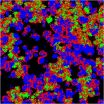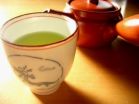(Press-News.org) WASHINGTON, April 7, 2014 — Spring has sprung, and with it comes blooming flowers, shorts and t-shirts and, for the millions who suffer from allergies, a runny nose, puffy eyes and general misery. In the American Chemical Society's (ACS') latest Reactions video, we explain the science behind the allergies that spoil spring for so many people. The video is available at http://youtu.be/vFZlxQU0Pyk.
INFORMATION:
Subscribe to the series at Reactions YouTube, and follow us on Twitter @ACSreactions to be the first to see our latest videos.
The American Chemical Society is a nonprofit organization chartered by the U.S. Congress. With more than 161,000 members, ACS is the world's largest scientific society and a global leader in providing access to chemistry-related research through its multiple databases, peer-reviewed journals and scientific conferences. Its main offices are in Washington, D.C., and Columbus, Ohio.
To automatically receive news releases from the American Chemical Society, contact newsroom@acs.org.
Follow us: Twitter Facebook
Why do we get allergies? The science of springtime sniffling and sneezing (video)
2014-04-07
ELSE PRESS RELEASES FROM THIS DATE:
Health benefits of 'green exercise' for kids shown in new study
2014-04-07
Children who are exposed to scenes of nature while exercising are more likely to experience health-enhancing effects after activity, according to a Coventry University study published this week in the International Journal of Environmental Research and Public Health.
Sports science academics in the University's Department of Applied Sciences and Health asked kids aged 9-10 years to complete a series of 15 minute moderate intensity cycling activities – one whilst viewing a video of a forest track synced to the exercise bike and another with no visual stimulus.
The researchers ...
Energizing sick mitochondria with vitamin B3
2014-04-07
Vitamins B have recently been turned out to be potent modifiers of energy metabolism, especially the function of mitochondria.
Vitamin B3, (niacin) has been found to delay the signs of aging in animal models.
An international collaboration between the University of Helsinki and École Polytechnique Fédérale de Lausanne reported today in the high-profile journal, Embo Molecular Medicine, that vitamin B3 form, nicotinamide riboside, can slow down the progression of mitochondrial disease, suggesting its potential as a novel therapy approach to adult-onset mitochondrial ...
Organic solar cells more efficient with molecules face-to-face
2014-04-07
New research from North Carolina State University and UNC-Chapel Hill reveals that energy is transferred more efficiently inside of complex, three-dimensional organic solar cells when the donor molecules align face-on, rather than edge-on, relative to the acceptor. This finding may aid in the design and manufacture of more efficient and economically viable organic solar cell technology.
Organic solar cell efficiency depends upon the ease with which an exciton – the energy particle created when light is absorbed by the material – can find the interface between the donor ...
Switching off anxiety with light
2014-04-07
Receptors for the messenger molecule serotonin can be modified in such a way that they can be activated by light. Together with colleagues, neuroscientists from the Ruhr-Universität Bochum (RUB) report on this finding in the journal "Neuron". An imbalance in serotonin levels seems to cause anxiety and depression. The researchers have provided a new model system for investigating the mechanism underlying these dysfunctions in cell cultures as well as living organisms.
G protein coupled receptors play an important role in medicine and health
One receptor, which is important ...
The tiniest greenhouse gas emitters
2014-04-07
Climate feedbacks from decomposition by soil microbes are one of the biggest uncertainties facing climate modelers. A new study from the International Institute for Applied Systems Analysis (IIASA) and the University of Vienna shows that these feedbacks may be less dire than previously thought.
The dynamics among soil microbes allow them to work more efficiently and flexibly as they break down organic matter – spewing less carbon dioxide into the atmosphere than previously thought, according to a new study published in the journal Ecology Letters.
"Previous climate ...
Exploring the genetics of 'I'll do it tomorrow'
2014-04-07
Procrastination and impulsivity are genetically linked, suggesting that the two traits stem from similar evolutionary origins, according to research published in Psychological Science, a journal of the Association for Psychological Science. The research indicates that the traits are related to our ability to successfully pursue and juggle goals.
"Everyone procrastinates at least sometimes, but we wanted to explore why some people procrastinate more than others and why procrastinators seem more likely to make rash actions and act without thinking," explains psychological ...
Green tea boosts your brain
2014-04-07
Green tea is said to have many putative positive effects on health. Now, researchers at the University of Basel are reporting first evidence that green tea extract enhances the cognitive functions, in particular the working memory. The Swiss findings suggest promising clinical implications for the treatment of cognitive impairments in psychiatric disorders such as dementia. The academic journal Psychopharmacology has published their results.
In the past the main ingredients of green tea have been thoroughly studied in cancer research. Recently, scientists have also been ...
New method for prostate cancer detection can save millions of men painful examination
2014-04-07
Each year prostate tissue samples are taken from over a million men around the world – in most cases using 12 large biopsy needles – to check whether they have prostate cancer. This medical procedure, which was recently described by an American urology professor as 'barbaric'**, shows that 70% of the subjects do not have cancer. The examination is unnecessarily painful and involves risk for these patients, and it is also costly to carry out. A patient-friendly examination, which drastically reduces the need for biopsies, and may even eliminate them altogether, has been ...
Rilpivirine combination product in pretreated HIV-1 patients: added benefit not proven
2014-04-07
The German Institute for Quality and Efficiency in Health Care (IQWiG) reassessed the antiviral drug combination rilpivirine/emtricitabine/tenofovir. In early 2012, the combination was approved for the treatment of adults infected with human immunodeficiency virus type 1 (HIV-1) who have not received previous antiretroviral treatment. For men, the Institute then found proof, and for women, indications of a considerable added benefit of the fixed combination in comparison with the appropriate comparator therapy.
In the end of 2013, the approval was expanded to people ...
Tropical Cyclone Peipah passes Palau, Philippines prepare
2014-04-07
Tropical Cyclone Peipah passed the island of Palau on April 5 moving through the Northwestern Pacific Ocean as it heads for a landfall in the Philippines. Peipah was formerly known as Tropical Cyclone 05W and was renamed when it reached tropical storm-force. Since then, however, wind shear has weakened the storm to a tropical depression.
On April 5 at 2100 UTC/5 p.m. EDT, Tropical Storm 05W, renamed Peipah (and known locally in the Philippines as Domeng) was located about 262 nautical miles east-southeast of Koror. It was centered near 5.5 north and 137.8 east and moving ...





